How to Clean Up Your Credit Report — and Boost Your Credit Score
Are records of past debt collections or bankruptcy on your credit report keeping your credit rating low? If so, it's time to do something about the situation. We can help you clean up your credit report and boost your credit score.
Problems from the past or data entered on your record by mistake shouldn't limit your ability to borrow money today. Boosting your credit score isn't that difficult if you know how to get damaging information removed from your credit report. Don't know where to start? Read on to learn more about the process of addressing issues contained in your credit report and fixing your credit score.
Can't spare the time to take the necessary steps to clean up your credit report yourself? Join us today to clean up your credit report and boost your credit score!
What Does It Mean to Clean Up My Credit Report?
Errors are common on credit reports. Details of how an account was closed, information that's outdated but was never removed, or listed accounts that aren't yours, are contained in many, if not most, credit reports. means removing inaccurate information, outdated entries, and even typographical errors.
Since your credit rating affects not only your ability to borrow money but other issues, like obtaining car insurance at the best rates, it's important to review the information contained in your credit report regularly. You need to know how to respond when you find information that unfairly impacts your access to credit and other benefits.
Why Should I Clean Up My Credit Report?
Cleaning up your credit report is essential for:
- Getting a mortgage
- Accessing an auto loan
- Getting a student loan
- Renting an apartment
- Signing a new phone contract
- Establishing a credit card
- Obtaining car insurance
- Accessing new medical insurance
- Setting up financing for dental or medical care
- Setting up financing from a jewelry store
- Getting the best interest rates
It's difficult to live satisfactorily in today's world without a good credit score. Challenges arise, which result in negative entries on credit reports. But your credit rating shouldn't be unfairly impacted by inaccurate or outdated information. Taking action to fix your credit report is one of the best steps you can take toward success in meeting your goals in life.
What Should I Look For in My Credit Report
Credit reports contain the following basic information:
- Your name and contact information
- A list of your accounts. Current loans, credit cards, etc.
- Credit inquiries by companies you have approached for loans and credit cards.
- Relevant public records and information submitted by creditors.
TekCollect Collections and Your Credit Report
One thing to look for on your credit report, and check for accuracy, is entries by TekCollect.
TekCollect, Inc is a debt collection company. Founded in Ohio in 2001, they are a medium-sized US company currently headquartered in Columbus, OH. Their mailing address is PO BOX 1269, Columbus, OH 43216.
If you've ever forgotten to pay a bill, they're probably on your credit report as a collections account. If so, the entry damages your credit rating. It will likely remain on your credit report for seven years, even after the forgotten bill is paid.
Though TekCollect is a legitimate company, they have received many complaints concerning inaccurate entries on credit reports. It can be difficult to get them to remove unverifiable, unauthorized, incomplete, or fraudulent negative items from your credit report. Information that is unfairly damaging to your credit rating.
We can take steps to help you remove inaccurate or outdated entries regarding collections from your credit report.
How Do Repossessions and Bankruptcies Affect Your Credit Rating?
Most occurrences that must be recorded on your credit report affect your credit rating for a period of seven years. But sometimes, removal is overlooked by the credit reporting bureau. You need to check your credit report to make certain negative information impacting your credit score is removed when the effective time period has passed.
How Can I Dispute Inaccurate Entries to Clean Up My Credit Report?
Disputing irrelevant or outdated entries relating to the following categories can be a time-consuming hassle. But it's an essential task in the process of cleaning up your credit report.
- Late payments
- Collections
- Inaccuracies
- Incomplete or misleading information
- Outdated information
- Accounts that don't exist
No time to compose letters to companies or credit bureaus to fix these issues? DoNotPay can help.
Specific Strategies for Successfully Disputing Your Credit Report
Successfully disputing inaccurate credit report entries can be accomplished by following proven strategies. You can take on the time-consuming, sometimes confusing, process yourself, or let .
Disputing Credit Report Entries by Regular Mail or E-mail
Regular mail, especially if sent by a delivery selection featuring tracks, offers a record of your contact. E-mail correspondence provides a record also. An internet search can usually unearth contacts within the proper channels for addressing your concern.
Phone calls can work, but they're less often recommended as they don't provide a viable record of your contact.
How to Dispute an Error in Your Credit Report
- As soon as you note an error on your credit report, you need to send a letter to dispute it. Direct a letter to the credit bureau immediately. Here are the contact addresses for the three major credit bureaus.
Equifax, PO Box 740256, Atlanta, GA 30374-0256 TransUnion LLC, Consumer Dispute Center PO Box 2000, Chester, PA 19016 Experian, PO Box 4500, Allen, TX 75013
- You may also need to contact the company that furnished the information involved.
- The credit bureau has 45 days to respond legally.
- Review the results of the investigation when you receive a response.
- Check for updates to your credit report if the ruling was in your favor.
Take further action if needed. Even a misspelled name or an error in your address can make a difference. Any inaccuracy or outdated entry must be corrected as soon as possible.
| Debt Validation Letters | They were sent by an individual to a creditor or collection agency. It requests proof that a debt is valid, not outside the timeframe for collection (the statute of limitations). |
| Removing a Late Payment From Your Credit Report | Late payments should be automatically removed from your credit report after seven years. You can also request a lender remove a late payment from your credit report. Send a goodwill adjustment (detailed later in this post) addressing the reason the item should be removed. |
| Removing Inquiries From Your Credit Report | Inquiries to your credit report that aren't related to any credit request you made should be removed immediately upon the credit bureau's investigation. |
Goodwill Adjustments and The Saturation Technique
You can request a goodwill adjustment to correct an error or any entry on your credit report that is negatively impacting your rating and which you feel deserves to be removed.
Perhaps you accidentally made a late payment, but your record, other than the single occurrence, is stellar. You should stand a good chance of having the entry removed if your request reaches the right person.
A goodwill adjustment is when a lender agrees to "retroactively make changes to the way it reports a borrower's account activity to the major credit reporting bureaus (Equifax, Experian, and TransUnion)." -LendingTree "What is a Goodwill Adjustment."
The Saturation Technique involves contacting as many relevant persons within a company as possible. Regular mail or email addresses can usually be found through internet searches. Sending correspondence detailing your request to these people, in several rounds if necessary, often results in getting the entry removed, thus improving your credit score.
Negotiating a Pay to Delete
In some cases, an agreement can be reached permitting payment of part of a debt in return for the removal of the item from your credit report. You can request such an agreement yourself, or, DoNotPay can help.
DoNotPay has a unique approach that combines all the methods aforementioned to strengthen your chances of cleaning up your credit report.
How to Send Demand Letters To for an Unresolved Credit Report Dispute
What if you have a legitimate complaint about items contained in your credit report, yet the credit bureau or company involved is unwilling to budge regarding your request for resolution? If the credit bureau and related parties don't respond to your request, you can take them to small claims court.
Potential Compensation for Failure to Clean Up Your Credit Report
Potential monetary compensation for actual damage is limited to $100 to $1000 and, in some cases, attorney fees and punitive damages (penalties charged as a type of punishment).
How to Clean Up Your Credit Report by Yourself
You can clean up your credit report on your own. But it will take time and thought to form a plan. You will need to assess the best approach for fixing the credit report issues you're facing, write letters, and follow up.
While it is possible to fix your credit report yourself, it will require focused effort and persistence. The steps can be complex, tedious, and painful. The result is worth the struggle. But if you don't feel up to the task, there is a solution. DoNotPay can help.
Is There an Easier Way to Clean Up My Credit Report?
If you want to clean up your credit report but don't know where to start, DoNotPay has you covered in three easy steps:
- Search Clean Credit Report on DoNotPay.
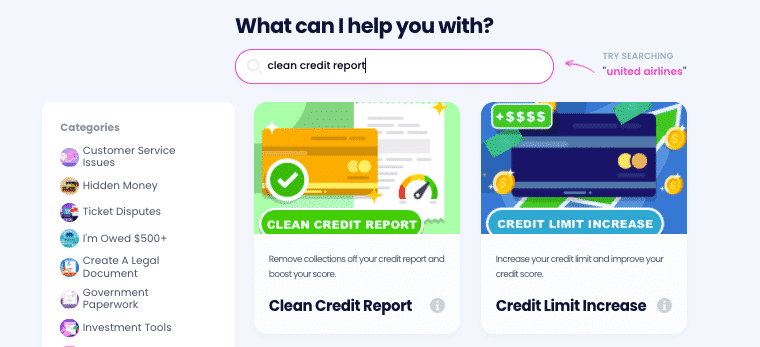
- Prepare a recent copy of your credit report that you can use as a reference.
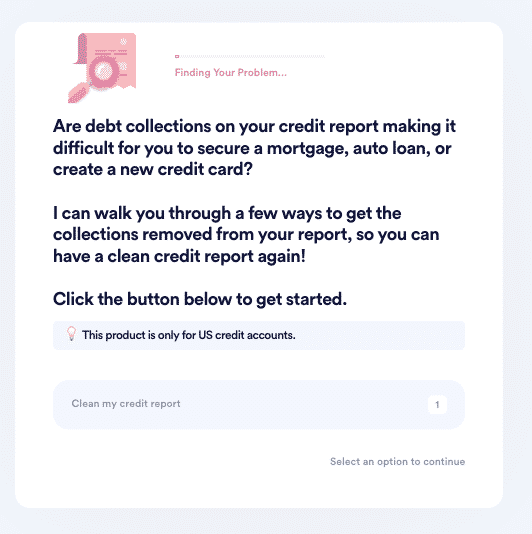
- Let us guide you through the 4 potential options:
- If you've already paid off your debt, we'll help you file a Goodwill Removal Request to get it removed.
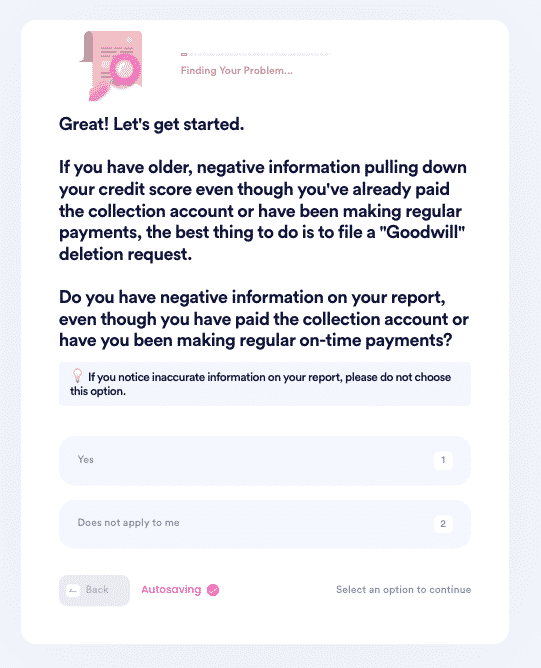
- If you notice any errors in your report (we have a list of common errors you can use!), we'll help you file a credit dispute to the creditor or major credit bureaus.
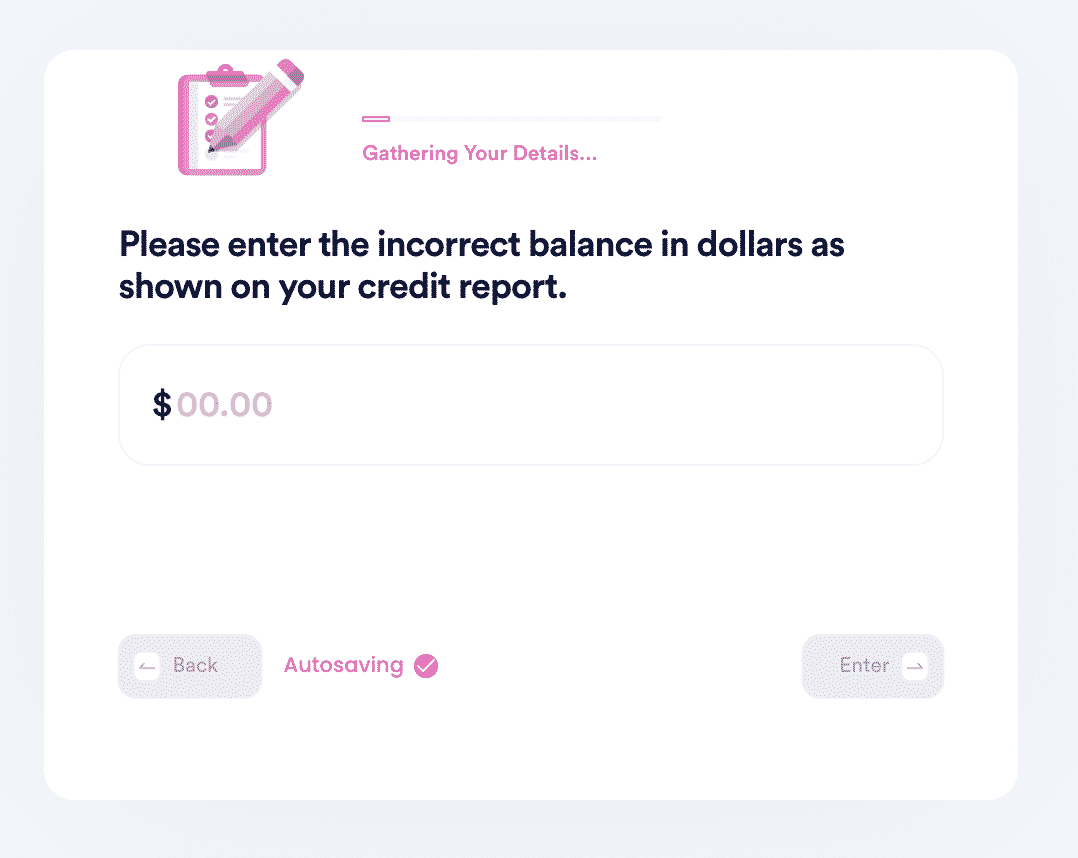
- If there are no errors, we'll check if you're still eligible to file a debt validation request. If they can't validate your debt, they're required to remove it from your report, and they can't collect it.
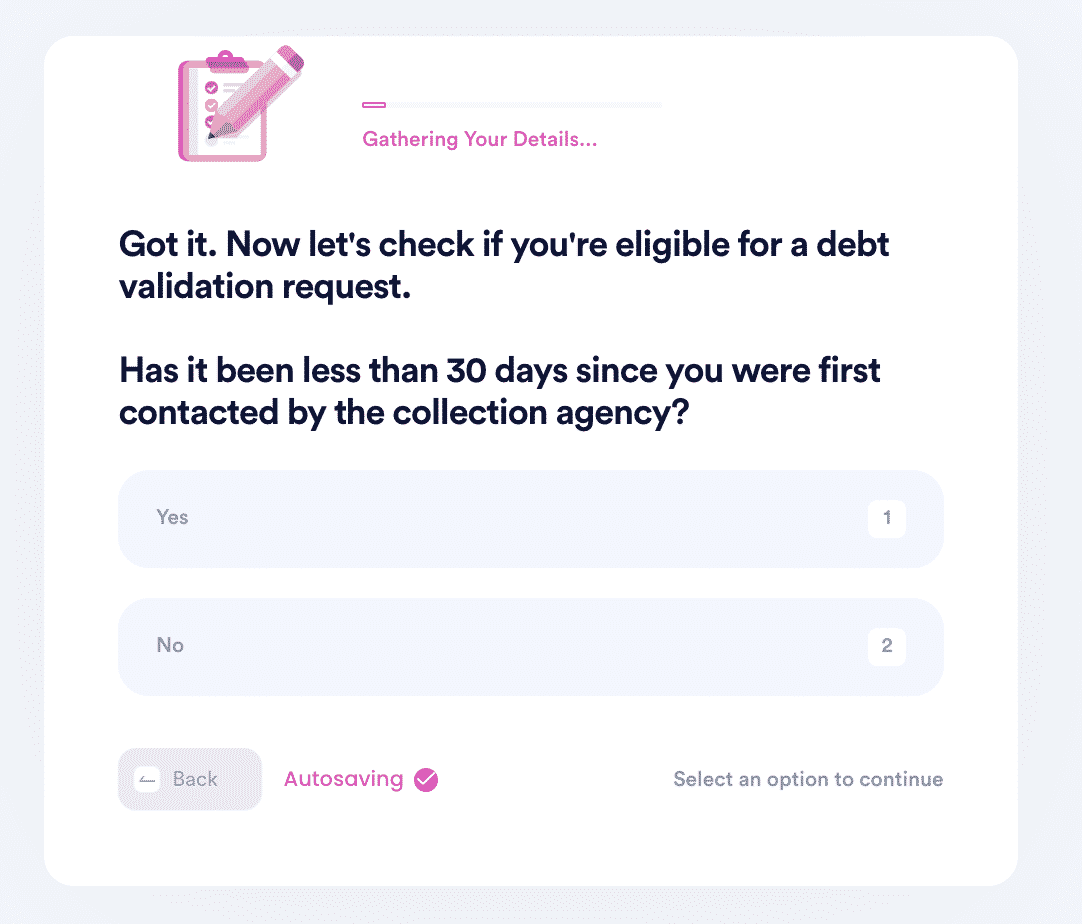
- Lastly, if none of the above options work, we'll help you file a pay-to-delete negotiation letter. You can customize the amount you are willing to pay in exchange for getting the item removed.

- If you've already paid off your debt, we'll help you file a Goodwill Removal Request to get it removed.
You can also check out our other credit products, including Credit Limit Increase, Get My Credit Report, Keep Unused Cards Active, and more.
It doesn't get any simpler than this. we will file the appropriate letter(s) to straighten out errors or remove outdated information from your credit report. We mail the letters since tracking provides an important record. You should receive a response from the creditor or credit bureau within a few weeks.
We Are Determined to Help You Save Time and Money
Reasons to use DoNotPay include the fact that it's fast - you don't have to spend hours determining the proper action. It's also easy. You are prevented from the tedious chore of filling out forms and keeping track of responses. And, you can be assured we will make the best effort possible to ensure the action to ensure the accuracy of your credit report is successful.
We seek out and contact whoever is necessary to resolve your credit report issue, whatever their location or association. Join us today!
 By
By